英语学习论文最佳学习效果论文:影响初中生提高英语成绩的因素及对策
初中英语教学有效性的影响因素及提升策略分析
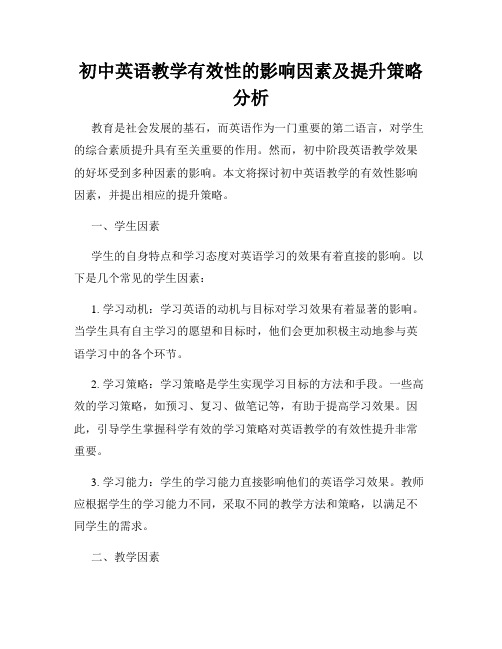
初中英语教学有效性的影响因素及提升策略分析教育是社会发展的基石,而英语作为一门重要的第二语言,对学生的综合素质提升具有至关重要的作用。
然而,初中阶段英语教学效果的好坏受到多种因素的影响。
本文将探讨初中英语教学的有效性影响因素,并提出相应的提升策略。
一、学生因素学生的自身特点和学习态度对英语学习的效果有着直接的影响。
以下是几个常见的学生因素:1. 学习动机:学习英语的动机与目标对学习效果有着显著的影响。
当学生具有自主学习的愿望和目标时,他们会更加积极主动地参与英语学习中的各个环节。
2. 学习策略:学习策略是学生实现学习目标的方法和手段。
一些高效的学习策略,如预习、复习、做笔记等,有助于提高学习效果。
因此,引导学生掌握科学有效的学习策略对英语教学的有效性提升非常重要。
3. 学习能力:学生的学习能力直接影响他们的英语学习效果。
教师应根据学生的学习能力不同,采取不同的教学方法和策略,以满足不同学生的需求。
二、教学因素教学因素是指教师在英语教学中的教学方法、内容安排以及教学资源的应用等方面的因素。
以下是几个重要的教学因素:1. 教学方法:教学方法是指教师运用的具体教学手段和策略。
不同的教学方法适用于不同的教学目标和学生特点。
灵活运用多种教学方法,如讲授法、讨论法、合作学习法等,可以提高教学效果。
2. 课程设计:优秀的课程设计可以提高课堂的吸引力和教学效果。
教师应根据学科特点和学生实际,合理安排教学内容,设计富有启发性和互动性的教学活动,使学生能够主动参与。
3. 教学资源:优质的教学资源对提高教学效果具有重要作用。
教师可以利用多媒体教具、教学软件等现代教学资源,丰富教学内容和形式,激发学生的学习兴趣和积极性。
三、家庭因素除了学生和教学因素外,家庭环境也对初中英语教学有效性产生影响。
以下是几个常见的家庭因素:1. 家庭教育观念:家庭教育观念对孩子的教育和学习态度产生重要影响。
家庭应注重培养学生对英语学习的兴趣,鼓励他们自主学习,创造良好的学习氛围。
影响中学生英语学习的因素及对策

影响中学生英语学习的因素及对策【摘要】在中学英语教学中,要想使学生克服消极情绪,保持良好的学习状态,并发挥出最佳的学习效果,老师、家长、社会都要共同努力,采取积极主动的方法才能奏效。
【关键词】英语学习;问题;策略在多年的教学实践中,笔者发现,在相同的教育教学条件(相同的社会环境、校风、班风和教师的教学指导,相似的家庭环境,相近的知识结构),不同的心理特征下,学生会表现出不尽相同的学习结果。
笔者经过仔细的观察、分析,认为下列因素与学习效果密切相关。
下面就谈谈影响英语学习的问题以及应该采取的对策。
(1)学生的英语基础薄弱。
影响英语教学的最基本的原因要数学生的基础薄弱的问题。
俗话说:基础不牢,地动山摇。
学生的基础没有打好是直接影响他们下阶段的英语学习的最基本的原因。
学好英语的三大基本因素是:语音(音标)、词汇、语法。
而我们的学生从开始学英语的时候基础并没有打好,他们不懂音标,词汇量少,语法知识贫乏。
由于他们音标没有掌握好,在教师只带读几遍的情况下,还无法记下单词的读音,影响了他们对单词的记忆,面对繁重的学习量,因为词汇量少,他们看不懂,听不出,难以理解教师课堂上的讲解,感觉无法适应英语教学。
长此以往,学生对英语学习逐渐失去兴趣,落下的知识越来愈多,觉得英语学习难以为继,成绩不断下降。
(2)学生对英语学习自信心不足。
自信心在英语学习中是一个不可缺少的重要心理品质,是英语学习取得成功的重要保证。
自信心较强的学习者常会抓住更多的机会学习和运用英语,而还有一些学生对英语学习还存在自信心不足的现象,他们大多来自农村,基础本来就薄弱,也很少开口读英语,随着年龄的增长,他们的自尊心更强,更要面子,他们特别注意别人对自己的评价,在与同学用英语交流时,往往有心理压力,常常处于消极防范的紧张状态中,唯恐当众出丑。
这种心理直接影响了他们的英语学习。
另外,在生活和学习中,有的家长对孩子期望过高,批评多于鼓励;学校里班级人数较多,一些教师只关注少数成绩好的学生,而对其他学生没有客观的评价和充分的肯定和鼓励。
如何大面积提高中学生英语成绩论文
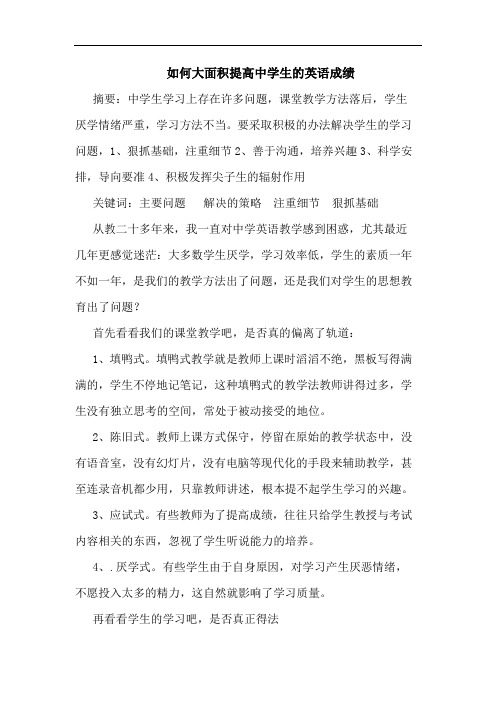
如何大面积提高中学生的英语成绩摘要:中学生学习上存在许多问题,课堂教学方法落后,学生厌学情绪严重,学习方法不当。
要采取积极的办法解决学生的学习问题,1、狠抓基础,注重细节2、善于沟通,培养兴趣3、科学安排,导向要准4、积极发挥尖子生的辐射作用关键词:主要问题解决的策略注重细节狠抓基础从教二十多年来,我一直对中学英语教学感到困惑,尤其最近几年更感觉迷茫:大多数学生厌学,学习效率低,学生的素质一年不如一年,是我们的教学方法出了问题,还是我们对学生的思想教育出了问题?首先看看我们的课堂教学吧,是否真的偏离了轨道:1、填鸭式。
填鸭式教学就是教师上课时滔滔不绝,黑板写得满满的,学生不停地记笔记,这种填鸭式的教学法教师讲得过多,学生没有独立思考的空间,常处于被动接受的地位。
2、陈旧式。
教师上课方式保守,停留在原始的教学状态中,没有语音室,没有幻灯片,没有电脑等现代化的手段来辅助教学,甚至连录音机都少用,只靠教师讲述,根本提不起学生学习的兴趣。
3、应试式。
有些教师为了提高成绩,往往只给学生教授与考试内容相关的东西,忽视了学生听说能力的培养。
4、.厌学式。
有些学生由于自身原因,对学习产生厌恶情绪,不愿投入太多的精力,这自然就影响了学习质量。
再看看学生的学习吧,是否真正得法1,不会学习。
学习无计划,学习无方法,死记硬背、题海战术、疲劳战术,不能发现自己存在的缺点。
2,使用的教辅资料质量不高,不成体系,太多太滥,增加学生的学习负担。
3,课下学习缺乏指导,不会主动寻找同学或者老师请教,导致碰到问题不能及时得到解决。
4,学习偏科。
对于某一学科没有掌握其学习规律,由不会学,进而有畏惧心理不想学,越拖成绩越差。
结合多年的教学经验我重点谈谈如何解决中学生的学习问题,仅供探讨《一》、狠抓基础知识,注重细节对学生的培养要从基础入手,注重平时的积累。
从平时的点滴做起:多背单词、多记词组、多做练习题,掌握英语语法和习惯用语的用法。
要求教师要精心设置课堂教学,对学生多动脑筋。
初中生怎么提升英语和语文成绩的方法

初中生怎么提升英语和语文成绩的方法Here is a 700-word English article on how middle school students can improve their English and Chinese language grades:Improving English and Chinese Language Grades for Middle School Students。
As a middle school student, maintaining strong academic performance in core subjects like English and Chinese language can be challenging, but with the right strategies and dedication, significant improvements are certainly achievable. In this article, we will explore effective methods that can help middle school students boost their grades and develop a stronger command of these crucial subjects.One of the key factors in improving English language skills is consistent practice. Middle school students should make it a habit to read English texts, whether it's novels, newspapers, or magazines, on a regular basis. Reading not only expands one's vocabulary but also familiarizes students with proper grammar, sentence structure, and the flow of the language. Additionally, regular reading helps train the brain to think in English, which is essential for excelling in areas like reading comprehension, writing, and even speaking.Another important aspect of enhancing English proficiency is to actively engage in conversation practice. Middle school students can find opportunities to converse with their English-speaking peers, teachers, or even online language partners. Conversing in English, even if it's initially uncomfortable or challenging, helps students become more confident and fluent in the language. It also allows them to receive immediate feedback and correction, which can be invaluable for improving their speaking and listening skills.When it comes to improving Chinese language skills, middle school students should focus on mastering the fundamentals, such as character recognition, vocabulary building, and grammatical structures. Regular practice in writing Chinese characters, both by hand and using digital input methods, can greatly enhance one's character recognition and writing abilities. Additionally, students should make an effort to read Chinese literature,newspapers, or magazines to expand their vocabulary and familiarize themselves with different styles of writing.Another effective strategy for improving Chinese language skills is to engage in discussions and debates in the language. Middle school students can participate in class discussions, join Chinese language clubs, or even organize study groups to practice their conversational skills. This not only helps them become more confident in speaking Chinese but also allows them to refine their ability to express their thoughts and opinions effectively.Furthermore, middle school students should not neglect the importance of grammar and sentence structure in both English and Chinese. Mastering the rules of grammar and sentence construction is crucial for producing well-written essays, reports, and other academic assignments. Students can utilize various resources, such as grammar workbooks, online tutorials, or even seek assistance from teachers or tutors, to strengthen their understanding of grammatical principles.In addition to the subject-specific strategies mentioned above, middle school students can also adopt general study habits that can contribute to overall academic success. Effective time management, creating a dedicated study space, and developing good note-taking skills can all play a significant role in improving grades across various subjects, including English and Chinese language.It's important to remember that improving language skills is a gradual process that requires consistent effort and dedication. Middle school students should be patient with themselves, celebrate small victories, and not be discouraged by occasional setbacks. By implementing the strategies outlined in this article and staying motivated, middle school students can steadily enhance their English and Chinese language proficiency, ultimately leading to better grades and a stronger foundation for future academic and personal success.。
提高中学生学习英语的有效方法论文
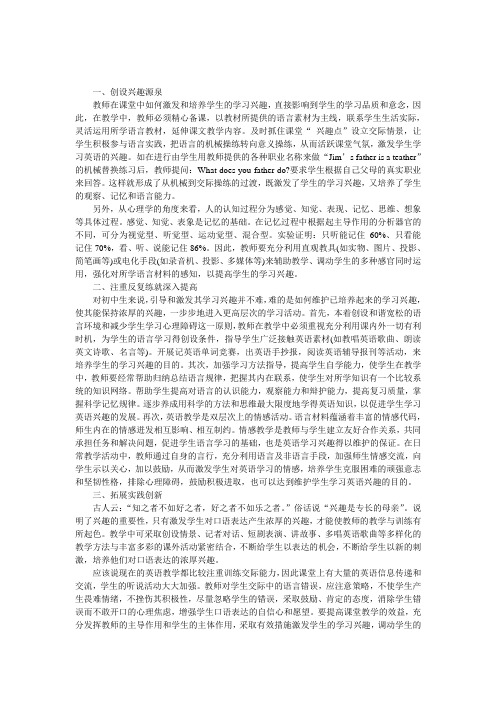
一、创设兴趣源泉教师在课堂中如何激发和培养学生的学习兴趣,直接影响到学生的学习品质和意念,因此,在教学中,教师必须精心备课,以教材所提供的语言素材为主线,联系学生生活实际,灵活运用所学语言教材,延伸课文教学内容。
及时抓住课堂“兴趣点”设立交际情景,让学生积极参与语言实践,把语言的机械操练转向意义操练,从而活跃课堂气氛,激发学生学习英语的兴趣。
如在进行由学生用教师提供的各种职业名称来做“Jim’s father is a teather”的机械替换练习后,教师提问:What does you father do?要求学生根据自己父母的真实职业来回答。
这样就形成了从机械到交际操练的过渡,既激发了学生的学习兴趣,又培养了学生的观察、记忆和语言能力。
另外,从心理学的角度来看,人的认知过程分为感觉、知觉、表现、记忆、思维、想象等具体过程。
感觉、知觉、表象是记忆的基础。
在记忆过程中根据起主导作用的分析器官的不同,可分为视觉型、听觉型、运动觉型、混合型。
实验证明:只听能记住60%、只看能记住70%,看、听、说能记住86%。
因此,教师要充分利用直观教具(如实物、图片、投影、简笔画等)或电化手段(如录音机、投影、多媒体等)来辅助教学、调动学生的多种感官同时运用,强化对所学语言材料的感知,以提高学生的学习兴趣。
二、注重反复练就深入提高对初中生来说,引导和激发其学习兴趣并不难,难的是如何维护已培养起来的学习兴趣,使其能保持浓厚的兴趣,一步步地进入更高层次的学习活动。
首先,本着创设和谐宽松的语言环境和减少学生学习心理障碍这一原则,教师在教学中必须重视充分利用课内外一切有利时机,为学生的语言学习得创设条件,指导学生广泛接触英语素材(如教唱英语歌曲、朗读英文诗歌、名言等)。
开展记英语单词竞赛,出英语手抄报,阅读英语辅导报刊等活动,来培养学生的学习兴趣的目的。
其次,加强学习方法指导,提高学生自学能力,使学生在教学中,教师要经常帮助归纳总结语言规律,把握其内在联系,使学生对所学知识有一个比较系统的知识网络。
提高初中英语学习成绩新举措论文

提高初中英语学习成绩的新举措初探英语作为中考的重要学科,长期以来备受学生和老师的关注。
如何提高初中英语学习成绩,也是学校、老师、学生和家长共同关注的课题。
我作为石柱民族地区的一名初中英语教师,一直以来,把提高学生的英语成绩作为自己研究的难题,加以攻克,并初见成效。
现梳理总结整理如下,与大家共勉。
一、树立信心良好的方法是成功的一半,我们要求学生养成每天读书的习惯,细水长流,积少成多,要想如此,除有浓厚的兴趣外,还得有坚强的决心和高度的自信心。
良好的学习习惯来源于自信心的培养,相信自己有能力学好外语,鼓励多动口,勤动手,听说读写,自己建立一个切合实际的目标,通过循序渐进的学习一点一滴的进步,使自己建立起成功感。
成功越多,自信心就越强。
在此基础上,养成以下习惯:在教师讲解贡语课文时,要边听、边体会课文各句的意思,把句子的发音、语调和句子所表达的意思联系起来,达到理解,在这个基础上,在一边听教师解说课文时,学生要边小声跟读和记(记句子、记句子里的单词和句子的语法结构),以提高他们的口语能力,学生的听和读,初步锻炼和提高,在操练中学生在听、说、读、写等方面才能得到进一步的锻炼和提高。
专心听讲在课上听老师讲课是一天学习的主要内容。
对于在校的学生来说,老师的讲授毕竟是知识的首要来源。
如果我们轻视上课听讲,那么我们就是在最严重的浪费时间。
教师施教的过程就是老师的知识和能力转化为学生的知识和能力的过程。
要寄希望于课堂,而不是寄希望于“课下”,要通过提高课堂效来减轻课下的学习负担。
听讲不仅要从兴趣出发,还要考虑学习的需要。
如果第一个问题你没听懂,不要在课上死钻“牛角尖”。
而要先记下来,接着往下听,不懂的地方可以在课下再去钻研。
要当堂掌握所学的知识最重要的是专心听讲,要把主要精神放在思考问题上。
如果记笔记妨碍了听课的话,干脆不记,以听懂为唯一目标。
消化整理课后及时独立地把老师上课讲的内容回想一遍,记住的往往是自己懂的部分,那些没记住的往往证明自己还没有掌握好。
影响初中生英语成绩的因素及提高方法

160影响初中生英语成绩的因素及提高方法★ 李娟成绩虽然不能代表着学生的一切,但是从考试成绩中可以发现学生们存在的不足,学习的短板并及时弥补,由此可见学习成绩的重要性。
基于此,本文以初中英语课程为例,对影响学生英语学习成绩的因素进行了一番探究并尝试提出相应的对策。
英语是学生们学习的第二种语言,是与世界接轨的有力工具。
与此同时,英语背后隐藏着一种文化,可以让我们了解到中西方之间的思维模式、历史演变和行为习惯,有利于开拓学生眼界、增长见闻,提升综合素养。
但是经过笔者的调查发现很多学生进入初中以后,英语成绩止步不前甚至倒退,这种情况不仅让学生自己感到困惑,甚至产生厌学心理,更让教师和家长忧心忡忡,因此有了本文探究的话题。
一、探究影响英语成绩的因素影响学生英语成绩的原因有很多,如家庭环境、教师水平和学生自身。
下面笔者将从这三个方面进行探究(一)家庭环境每个学生家庭成长环境不同,家长的收入、受教育水平、行为举止等方面有很大的差异,这是影响学生英语成绩的重要因素之一。
有些家长喜欢追求新鲜的事物,与孩子的关系较为融洽、民主,能和孩子谈心,共同寻找问题的所在,也愿意和孩子共同学习英语;而有些家长思想较为落后,将教育的重任交给了学校或者课外辅导班,自己置身事外;还有的家长自身能力有限,不能给孩子提供有力的帮助,从而导致学生英语成绩的存在差异性。
(二)教师方面教师已经习惯掌控课堂、主导课堂,因此会充分利用课堂每一分钟进行教授活动,希望把自己所学的知识一股脑的传授给学生,出发点是好的,但是占据了学生们自己思考、提出问题、延伸问题的时间,不利于学生的长足发展;有些教师只依赖于教材文本,既不引进课外教学资源,也不联系生活实际,让学生习得的知识无“用武之地”,逐渐扼杀了孩子的好奇心、阻碍了学生的求知欲。
(三)学生自身学生错误的认知观念,不重视英语课程的学习;部分学生对英语学习始终存在畏难心理;缺乏学习的主动性和积极性也是影响学生英语学习成绩的原因之一。
影响中学生英语学习效果的因素及策略
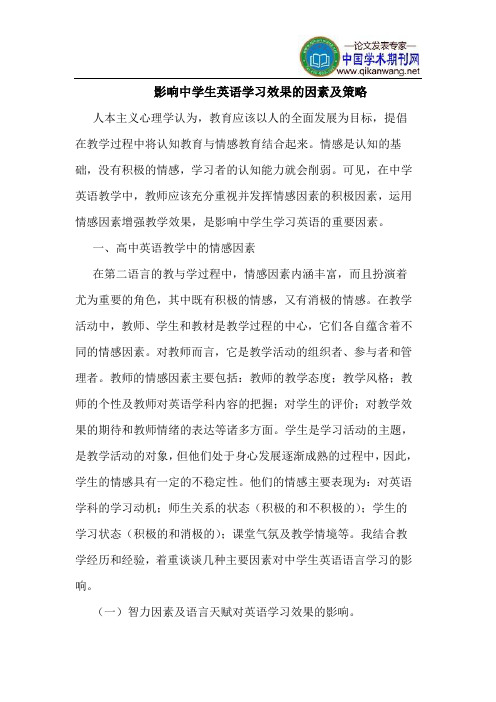
影响中学生英语学习效果的因素及策略人本主义心理学认为,教育应该以人的全面发展为目标,提倡在教学过程中将认知教育与情感教育结合起来。
情感是认知的基础,没有积极的情感,学习者的认知能力就会削弱。
可见,在中学英语教学中,教师应该充分重视并发挥情感因素的积极因素,运用情感因素增强教学效果,是影响中学生学习英语的重要因素。
一、高中英语教学中的情感因素在第二语言的教与学过程中,情感因素内涵丰富,而且扮演着尤为重要的角色,其中既有积极的情感,又有消极的情感。
在教学活动中,教师、学生和教材是教学过程的中心,它们各自蕴含着不同的情感因素。
对教师而言,它是教学活动的组织者、参与者和管理者。
教师的情感因素主要包括:教师的教学态度;教学风格;教师的个性及教师对英语学科内容的把握;对学生的评价;对教学效果的期待和教师情绪的表达等诸多方面。
学生是学习活动的主题,是教学活动的对象,但他们处于身心发展逐渐成熟的过程中,因此,学生的情感具有一定的不稳定性。
他们的情感主要表现为:对英语学科的学习动机;师生关系的状态(积极的和不积极的);学生的学习状态(积极的和消极的);课堂气氛及教学情境等。
我结合教学经历和经验,着重谈谈几种主要因素对中学生英语语言学习的影响。
(一)智力因素及语言天赋对英语学习效果的影响。
智力一般可以认为是人的各种基本能力的总和,包括观察力、注意力、记忆力、想象力、思维力等。
至于语言天赋,有语言专家认为,它应包括四种能力:语言编码能力、语言感受能力、语言记忆能力、推理能力。
智力有不同层次,但心理学研究表明,除低常和超常外,绝大多数儿童和青少年属于智力正常水平,也就是说,在同一个教学班中所谓“弱智”或“神童”都是比较罕见的。
因此,智力因素及语言天赋对学生的英语学习效果的影响并不是主流。
当然,教师要学会培养和发展学生的学习能力,特别是对那些在语言方面没有所谓天赋的孩子更多的关注和耐心,努力发现他们的特长,多用鼓励的方式和他们交流,多给他们锻炼和表现的机会,通过这样的“特别关爱”弥补他们先天的不足,这是非常重要的。
如何提升英语成绩初中生作文

如何提升英语成绩初中生作文Improving English Scores for Middle School StudentsLearning a new language can be a challenging and daunting task, especially for middle school students who are already juggling a variety of academic subjects and extracurricular activities. However, with the right strategies and a dedicated mindset, it is entirely possible for middle school students to significantly improve their English scores and proficiency. In this essay, we will explore several effective ways for middle school students to enhance their English language skills and achieve better academic results.Firstly, it is crucial for middle school students to develop a strong foundation in English grammar. Grammar is the backbone of any language, and a solid understanding of grammatical rules and structures is essential for effective communication, both in written and oral forms. Students should dedicate time to studying and practicing various grammatical concepts, such as sentence structure, verb tenses, subject-verb agreement, and parts of speech. This can be achieved through targeted exercises, worksheets, and onlineresources that provide interactive and engaging learning experiences.Secondly, middle school students should focus on expanding their English vocabulary. A rich vocabulary not only enhances their ability to express themselves more clearly and precisely but also helps them better comprehend written and spoken English. Students can adopt various strategies to expand their word knowledge, such as reading extensively across different genres, keeping a vocabulary journal, and using flashcards or language learning apps to systematically study and retain new words. Additionally, students should strive to incorporate the new vocabulary they have learned into their daily conversations and written work, as this will help solidify their understanding and improve their overall language proficiency.Another important aspect of improving English scores for middle school students is to develop strong reading and comprehension skills. Reading not only exposes students to a wide range of vocabulary, sentence structures, and cultural references but also helps them better understand the nuances of the language. Encourage students to read a variety of texts, from classic literature to contemporary fiction, news articles, and informative non-fiction. Encourage them to actively engage with the material by asking questions, making predictions, and summarizing the key points. Additionally, provide opportunities for students to practice their reading comprehension through activities such as answeringcomprehension questions, identifying the main idea, and analyzing the author's purpose and tone.Effective writing skills are also crucial for improving English scores. Middle school students should be given ample opportunities to practice various forms of written expression, such as essays, narratives, and research papers. Encourage them to focus on developing a clear and coherent writing style, with attention to organization, grammar, and mechanics. Provide feedback and guidance on their writing, helping them identify areas for improvement and implement strategies to enhance their writing skills. Additionally, expose students to various writing models and examples to help them understand the characteristics of effective writing.Oral communication skills are another essential component of improving English scores for middle school students. Encourage students to actively participate in class discussions, presentations, and debates. This will not only help them build confidence in speaking English but also improve their listening and comprehension skills. Additionally, consider organizing speaking activities, such as role-playing, impromptu speeches, or group discussions, to provide students with opportunities to practice their oral communication skills in a supportive environment.Finally, it is important for middle school students to immerse themselves in the English language as much as possible. Encourage them to consume English-language media, such as movies, TV shows, music, and podcasts. This exposure to authentic language use can greatly enhance their understanding of idiomatic expressions, colloquialisms, and cultural references, which are essential for effective communication. Additionally, consider organizing extracurricular activities or language exchange programs that allow students to interact with native English speakers or their peers who are also learning the language.In conclusion, improving English scores for middle school students requires a multifaceted approach that addresses various aspects of language learning, including grammar, vocabulary, reading comprehension, writing, and oral communication. By implementing these strategies and fostering a supportive learning environment, middle school students can develop a strong foundation in the English language and achieve better academic results. With dedication, persistence, and a willingness to embrace the challenges of language learning, middle school students can unlock the countless benefits of proficiency in English and set themselves up for future success.。
新课改下如何提高初中毕业生英语学习成绩论文

浅析新课改下如何提高初中毕业生英语学习成绩【摘要】初中毕业班的一些英语教师为了迎合应试,课堂实行满堂灌,课下布置海量作业,费时费力又收效甚微,还造成学生对英语学习不感兴趣,影响考试成绩。
在新课改教育的大背景下,该文就如何传授英语学习方法、培养学生英语学习兴趣,提高初中毕业生英语学习成绩,提出几点方法。
【关键词】针对性学习兴趣师生情感因素培养一、讲课要重视针对性,激发英语学习热情针对性是培养学生学习动机的关键,学习动机是推动学习的内因,如果学生们对某一学科产生厌学,就无法期望其在这一学科上取得优良的成绩。
老师要从当今英语的广泛应用以及英语在今后学习上的重要地位等方面向学生进一步讲明英语学习的重要性,引导学生把英语学习变成其内在需要。
英语教师要认真备课,既备教材又备学生,上课不能随意性太强。
讲课不能面面俱到满堂灌。
有些教师从上课讲到下课,结果教师讲累了,学生听打瞌睡了,学生也不知哪是重点,哪是难点,不会的还是没听懂,学习效率非常低。
因此,教师讲课一定要精,要有针对性。
要强调学生学习的难点和易错点,并且把难点、易错点放在学生注意力集中的前十分钟讲,这样讲课效果会更好。
激发学生学习英语的热情同样重要,使学生对每学期英语教学的内容,难点,重点分布做到心中有数,使学生克服为难情绪,增强学习自信心。
老师用饱满的激情、流利的英语、精当的教学安排、娴熟的驾御课堂能力征服学生。
良好的开端是成功的一半,要取得学生中考成功的关键在于每一节课,要关注平时的每一节课,努力上好每一节课,上成高效率,高收获的精品课。
每一个单元开始的时候,要根据这个单元的特点准备一个有趣的或有吸引力的导入。
或是一个有趣的故事、或是一段优美的歌词或小诗、或是一段精彩的演讲、或是对这一单元的介绍、或是一曲优美的歌曲、或是同学们的精彩的讨论。
这样就很容易激发学生学习热情,学生有了学习热情,教学就事半功倍。
二、运用灵活的教学方法,培养学生学习兴趣关注学生需要老师有百般的耐心,细心和爱心。
如何提升英语成绩初中生作文

How to Improve English Scores for JuniorHigh StudentsEnglish, as an international language, plays a crucial role in today's interconnected world. For junior high students, mastering English not only helps in academic pursuits but also prepares them for future professional opportunities. However, improving English scores can be challenging, especially for those who struggle with the language. Here are some tips for junior high students who want to enhance their English proficiency.1. Consistent Practice: The key to improving English is regular practice. Students should aim to read, write, speak, and listen to English daily. Reading English newspapers, novels, or even watching English movies and listening to English music can help improve vocabulary, grammar, and pronunciation.2. Vocabulary Building: A rich vocabulary is essential for effective communication in English. Junior highstudents should make it a habit to learn new words andtheir meanings regularly. They can use vocabulary books,online resources, or even create their own word lists to remember new words.3. Grammar Mastery: Grammar is the backbone of English, and it's crucial for students to understand and apply it correctly. Regular practice of grammar exercises, participating in grammar-focused activities, and seeking clarification from teachers or peers can help improve grammar skills.4. Speaking Practice: Speaking English fluently requires constant practice. Students should speak English with their classmates, family members, or even with themselves. They can also join English clubs or language exchange groups to practice speaking with native speakers.5. Listening Skills: Listening is an integral part of language learning. Junior high students should make an effort to listen to English podcasts, audiobooks, or even English-speaking TV shows and movies. This will help them improve their comprehension skills and familiarize them with different accents and speaking styles.6. Writing Practice: Writing is another crucial skill in English. Students should write regularly, whether it'sfor school assignments or for personal practice. They can start by writing simple essays or stories and gradually progress to more complex writing tasks. Getting feedback from teachers or peers can help identify areas for improvement.7. Active Participation: Junior high students should actively participate in class discussions and activities related to English. This will not only help them improve their language skills but also boost their confidence. They can also take part in debates, quizzes, or othercompetitive activities to test their knowledge and skills.In conclusion, improving English scores for junior high students requires a combination of regular practice, vocabulary building, grammar mastery, speaking practice, listening skills, writing practice, and activeparticipation. By following these tips, students can enhance their English proficiency and achieve better scores in their academic pursuits.**如何提升初中生的英语成绩**英语作为国际语言,在当今互联世界中扮演着至关重要的角色。
影响英语学习的因素英语作文
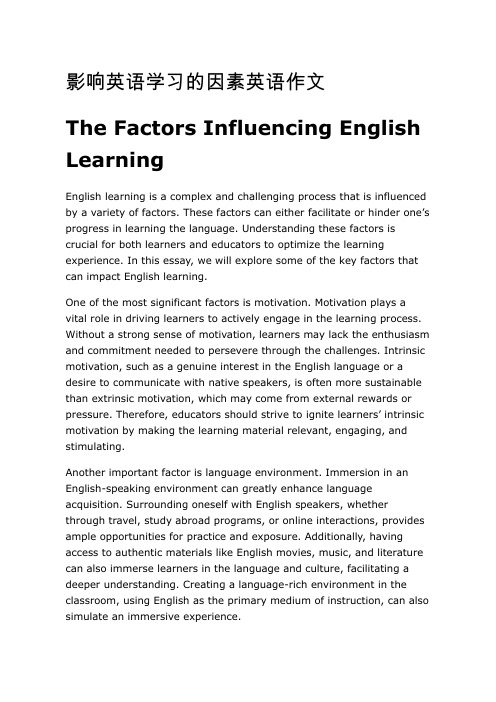
影响英语学习的因素英语作文The Factors Influencing English LearningEnglish learning is a complex and challenging process that is influenced by a variety of factors. These factors can either facilitate or hinder one’s progress in learning the language. Understanding these factors is crucial for both learners and educators to optimize the learning experience. In this essay, we will explore some of the key factors that can impact English learning.One of the most significant factors is motivation. Motivation plays a vital role in driving learners to actively engage in the learning process. Without a strong sense of motivation, learners may lack the enthusiasm and commitment needed to persevere through the challenges. Intrinsic motivation, such as a genuine interest in the English language or a desire to communicate with native speakers, is often more sustainable than extrinsic motivation, which may come from external rewards or pressure. Therefore, educators should strive to ignite learners’ intrinsic motivation by making the learning material relevant, engaging, and stimulating.Another important factor is language environment. Immersion in an English-speaking environment can greatly enhance language acquisition. Surrounding oneself with English speakers, whether through travel, study abroad programs, or online interactions, provides ample opportunities for practice and exposure. Additionally, having access to authentic materials like English movies, music, and literature can also immerse learners in the language and culture, facilitating a deeper understanding. Creating a language-rich environment in the classroom, using English as the primary medium of instruction, can also simulate an immersive experience.Learning strategies also play a crucial role. Different learners have different learning styles, and it is essential to identify and employ strategies that suit individual needs. Some learners may benefit from visual aids, while others may prefer auditory or kinesthetic approaches. Techniques such as note-taking, summarizing, and practicing with flashcards can aid in memory retention. Moreover, effective time management and regular review of learned material are essential for long-term retention. Educators can guide learners in developing these strategies and provide feedback to help them optimize their learning.The quality of instruction is another critical factor affecting English learning. A competent and experienced teacher can make a significant difference in a learner’s progress. A good teacher should have a solid understanding of the language and teaching methods, as well as the ability to adapt to the diverse learning needs of students. They should provide clear explanations, engaging activities, and personalized feedback to help students overcome difficulties and build confidence. Additionally, a positive and supportive learning environment created by the teacher can boost students’ motivation and participation.Native language interference can pose a challenge for English learners, especially when there are significant differences between the native and target languages. Phonological, grammatical, and lexical similarities or differences can affect pronunciation, sentence structure, and vocabulary acquisition. Learners may unconsciously transfer patterns and structures from their native language to English, resulting in errors. Awareness of these interferences and consistent practice in correcting them are crucial for improving language proficiency.English learning is a multifaceted process influenced by various factors. Motivation, language environment, learning strategies, quality of instruction, and native language interference all play significant roles in determining a learner’s success. To enhance English learning, learners should cultivate intrinsic motivation, seek immersive environments, adopt effective learning strategies, and have access to quality instruction. Educators, on the other hand, should create conducive learning environments, tailor instruction to individual needs, and provide support and guidance. By understanding and addressing thesefactors, learners and educators can work together to maximize the effectiveness of English language learning.。
浅析影响初中英语学习效果的主因及对策

浅析影响初中英语学习效果的主因及对策在英语学习中,同一班级,成绩两极分化严重,有部分学生学习相当吃力,成绩上不去。
于是,我常思索,到底是哪些因素影响和制约了学生学习英语的效果?有没有对策来有效地提高学生的学习成绩?针对这些困惑,结合教学实践谈谈自己的几点看法:一、智力及语言天赋对英语学习效果的影响智力及语言天赋对学生英语学习效果的影响虽然不大,但在教学中,要学会培养和发展学生的学习能力,特别是对那些在语言方面没有所谓天赋的孩子要更多地关注和耐心,努力发现他们的特长,多用鼓励的方式和他们交流,多给他们锻炼和表现的机会,通过“特别关爱”来弥补他们先天的不足。
二、年龄对英语学习效果的影响年龄对英语学习效果有很大的影响。
青少年学习第二语言的能力和速度远远大于成年人。
他们记性好,反应快,接受能力强,尤其是处于13-16岁的初中学生更是英语学习的黄金时段。
因此,在平时的教学实践中,要注意对学生全方位语言学习身体器官的刺激和调动,如视觉、触觉、听觉、嗅觉等,设计符合学生发展个性的教学活动、手段、策略和方法,最大限度地发挥学生的潜能和优势,培养学习兴趣,不断取得进步,发挥最好的学习效果。
三、动机和兴趣对英语学习效果的影响动机就是学生学习英语的原因和目的。
教学中,我们要通过各种方式方法,使学生深刻认识到学习英语的重要性。
在这种良好动机的驱使下,学生对英语会产生极大的学习热情,会持久、稳定地努力学习,自己总是想方设法多学些英语知识,例如主动多听多读英语,自己找课外读物来提高自己的英语水平,并且学习效果也显著得多。
如果学生对学习缺乏兴趣就会觉得学习枯燥无味,当然也会丧失学习的恒心和毅力。
所以,英语教学的关键是根据不同的教学内容,结合学生实际,采取不同的教学方式,开展形式多样的教学或学习活动,激发学生对英语的学习兴趣,保证学生持续不断地处于积极的心理状态,让教学或学习能获得最佳的效果。
四、学习程度对英语学习效果的影响动机是推动学习的内在力量,而努力学习的程度是动机转化为行为的具体表现。
浅析影响中学生英语学习效果的因素及调节策略[修改版]
![浅析影响中学生英语学习效果的因素及调节策略[修改版]](https://img.taocdn.com/s3/m/25afc08ff46527d3250ce03b.png)
摘要:英语学习是一个缓慢、复杂、需要我们付出大量时间与精力的过程。
而在当代,英语学习又是十分必要的,它直接关系到我们未来的发展。
随着时代的不断进步,促进学生有效地学习英语是十分必要的。
这其中,如果找到影响学生英语学习效果的因素的话,教师的工作量可以说将会事半功倍。
本文将从学生智力因素、动机和兴趣因素、学生学习习惯、语言环境、班集体氛围及师生关系和学习者年龄因素入手进行分析,归纳教师在授课中以及和学生生活中相处时可以采取的教学策略,旨在提高课堂效率,促进学习目标的达成。
关键词:英语学习影响英语学习效果的因素调节策略一、中学生英语学习效果影响因素分析1.动机和兴趣因素。
兴趣是指人力求探究某种事物或进行某种活动的心理倾向,是一种特殊的认识倾向,表现在对感兴趣的事物的感知、记忆、想象和思维上,也表现在对有关事物的优先注意和集中注意上。
所以说,对英语感兴趣的学生,在英语学习时就会很自然地集中注意力,专注认真。
一个学生一旦对学习英语产生了浓厚的兴趣,把学习看成他自己的愿望和需要,他学起来就会精神愉快,不知疲倦,越学越爱学。
相反,如果没有兴趣,学生就会感到是一种负担甚至产生厌烦情绪。
因此,提高学生学习英语的兴趣是提高教学质量的一个关键因素。
2.英语学习习惯。
好的学习习惯是学好一门知识的基础。
在英语学习中,学习习惯尤其重要。
第一点,课堂中要认真听讲。
研究表明,在一节课当中并不是所有人都可以一直保持着足够的注意力。
所以这里谈到的认真听讲即是学会怎样听讲。
抓重点听、抓老师的强调点听才是关键。
第二点,英语学习需要多磨耳朵多动嘴。
学习一门外语最重要的就是听和说,养成良好的学习习惯,每天练听力,在语言环境中尽量多使用英语,会对英语学习的效果产生巨大的影响。
3.语言环境。
学生所处的语言环境会对学生的英语学习产生巨大的影响,这一点是经常被英语教师所忽略的,它却是真实存在的。
bialystok也在其语言学习模式中提出了著名的“输入层”概念,指学习者接触目标语的语境,也就是学习者在进行语言活动时所处的环境。
英语学不好的原因及方法作文作文

英语学不好的原因及方法作文作文English: There are several reasons why some people struggle to learn English. First, lack of motivation can be a major factor. If a person doesn't see the practical use of learning English in their daily life, they may not feel motivated to put in the effort to learn. Second, inadequate exposure to the language can hinder learning. If a person doesn't have opportunities to practice speaking and listening to English, their language skills may not improve. Third, ineffective learning methods can also contribute to difficulties in learning English. Simply memorizing vocabulary and grammar rules without practical application may not lead to proficiency. Finally, fear of making mistakes can hold people back from practicing and using English. This fear can create a barrier to language learning progress. To overcome these challenges, individuals can find ways to make learning English more relevant and meaningful to their lives, such as connecting with English speakers, finding enjoyable ways to practice the language, and creating a supportive and encouraging learning environment.中文翻译: 有几个原因会导致一些人学习英语困难。
提高初中英语学习效率[论文]
![提高初中英语学习效率[论文]](https://img.taocdn.com/s3/m/8d7bd84bbe1e650e52ea9980.png)
提高初中英语学习效率学好英语并不是一件难事,关键在于要掌握好的学习方法。
学习方法自然是因人而异、因时而异的。
其实方法本身无所谓好与坏,关键就看它能否完美地与个人相结合,提高学习效率。
如果一套方法能够激发你的学习兴趣,提高学习效率的话,就要坚持下去。
一、词汇词汇是学好英语的关键,没有足够的词汇就无从谈起听、说、读、写。
词汇量的大小决定一个学生英语水平的高低。
在学习词汇的过程中,要掌握词的拼读规则,根据规则记忆单词;同时还要根据构词法知识记忆和扩充单词,通过语境理解和记忆单词也是一个最佳学习单词的好方法。
目前词汇在中考试题中汉译英的试题越来越少,取而代之的是词汇在语境中的运用考查比重越来越大。
在进入学习英语的初级阶段时,掌握语音知识是学好英语单词的基础,读准英语音素是拼读音标的前提。
因此一定要熟练掌握48个音素,要做到会拼读、拼写。
还要注意训练自己听音、辨音和模仿的能力。
课堂上,专心听老师的发音和磁带上的录音,争取当堂学会。
对于那些比较拗口的单词、短语或句子,课下一定要挤时间反复模仿,直到读准、读熟为止。
再次,熟练掌握读音规则,培养自己根据读音规则把字母(或字母组合)与读音建立起联系的能力。
因为掌握拼读规则对单词的记忆很有好处。
为此要经常复习巩固每单元的“listen,read and say”和课本附录中的“pronunciation and spelling”,如果能够熟练掌握它,它可就成为你记忆单词的好帮手了。
记单词这一难关非常关键。
记忆单词的方法很多。
(1)按读音记忆单词。
实际上在你看单词时就要顺便看一眼音标,掌握字母及字母组合的读音规律。
将所有符合规则的单词归类记忆。
如:①按开、闭音节记忆,掌握元音字母的读音。
bag: cat,map, sad;cake: name, plane, date; desk: next, set,step, let; these: chinese, japanese; hit: big, ship,this, kill; like: side, nice, kite,mine ; not: dog,hot, stop, got; nose: note, those, close, hole ; bus:nut, cup, rubber, dust; use: huge等。
英语作文如何提高初中英语成绩范文

Title: Enhancing Your Junior High School English Scores: Effective Strategies and Tips Achieving excellence in English during junior high school sets a solid foundation for your future academic endeavors. Whether you aspire to master the language for personal growth, academic success, or global communication, adopting effective strategies can significantly boost your English scores. Here are some proven tips to help you elevate your English proficiency and enhance your grades.**1. Establish a Daily Routine for English PracticeConsistency is key. Dedicate a specific time each day to engage with English materials. This could include reading English articles, listening to English podcasts or songs, practicing grammar exercises, or even writing short essays or journal entries. By making English a daily habit, you'll gradually improve your fluency, vocabulary, and understanding.**2. Immerse Yourself in English ContentExpose yourself to as much English as possible. Watch English movies and TV shows with subtitles, initially in your native language and gradually switching to English-only subtitles. Read books, magazines, and newspapers in English, even if you need to use a dictionary frequently. This immersion will help you develop a natural ear for the language and improve your comprehension skills.**3. Expand Your VocabularyVocabulary is the building block of any language. Make a habit of learning new words daily and incorporating them into your conversations and writing. Use flashcards, vocabulary apps, or even create your own word lists to help with memorization. Remember, context is important; try to understand how words are used in sentences and different contexts.**4. Practice Grammar and Sentence StructureGrammar forms the backbone of effective communication. Review grammar rules regularly and apply them in your writing and speaking. Practice constructing complex sentences, paying attention to subject-verb agreement, tense usage, and punctuation. Regular grammar exercises and quizzes can help reinforce your knowledge.**5. Improve Your Listening and Speaking SkillsListen actively to English audio content, focusing on pronunciation, intonation, and idioms. Try to mimic what you hear to improve your own speaking abilities. Join English language clubs, participate in debates or discussions, and practice speaking with native speakers whenever possible. Don't be afraid to make mistakes; they are an essential part of the learning process.**6. Utilize Technology and Online ResourcesTake advantage of the vast array of online resources available to enhance your English skills. There are numerous educational websites, mobile apps, and online courses that offer interactive lessons, practice tests, and personalized feedback. Utilize these tools to supplement your classroom learning and tailor your studies to your specific needs.**7. Seek Feedback and Collaborate with OthersDon't hesitate to ask your teachers or peers for feedback on your English writing and speaking. Their insights can help you identify areas for improvement and provide guidance on how to overcome challenges. Collaborating with classmates on group projects or language exchange partners can also motivate you and offer fresh perspectives.**8. Maintain a Positive Attitude and Stay MotivatedLearning a language takes time and effort, and progress may not always be linear. It's important to maintain a positive attitude and celebrate your achievements, no matter how small. Set realistic goals for yourself and reward yourself when you reach them. Remember, every step forward is a step closer to fluency.In conclusion, enhancing your junior high school English scores requires dedication, consistent effort, and a willingness to embrace challenges. By incorporating these strategies into your daily routine, you'll be well on your way to mastering the language and achieving academic success. Remember, language learning is a lifelong journey; enjoy the ride!。
初中英语作文提高成绩的方法和技巧

初中英语作文提高成绩的方法和技巧Title: Methods and Techniques to Improve Grades in Middle School English CompositionIntroduction:English is a subject that many students struggle with in middle school. However, with the right methods and techniques, students can improve their grades in English composition and become proficient in the language. In this article, we will discuss some effective strategies to help students boost their performance in middle school English.1. Reading and writing regularly:One of the best ways to improve your English composition skills is by reading and writing regularly. Reading different types of texts, such as novels, newspapers, and magazines, will help you expand your vocabulary and improve your sentence structure. Writing essays, journal entries, and stories will also help you develop your writing skills and express yourself more effectively.2. Practice grammar and punctuation:Grammar and punctuation are essential components of English composition. To improve your grades in English, it is important to practice and master these aspects of the language. Take the time to review grammar rules, such as subject-verb agreement, verb tenses, and sentence structure. Pay attention to punctuation marks, such as commas, periods, and quotation marks, and use them correctly in your writing.3. Seek feedback from teachers and peers:Feedback is crucial for improving your English composition skills. Ask your teacher to review your essays and provide constructive criticism. Take note of their suggestions and use them to make revisions to your writing. You can also ask your peers to read your work and offer feedback. Working collaboratively with others can help you identify areas for improvement and learn from your mistakes.4. Expand your vocabulary:A strong vocabulary is essential for writing well in English. To improve your vocabulary, make an effort to learn new words every day. Use a dictionary or a thesaurus to look up unfamiliar words and their meanings. Practice using these words in sentences to familiarize yourself with their usage. The morewords you know, the more effectively you will be able to communicate your ideas in writing.5. Study literary devices and techniques:Literary devices and techniques can enhance the quality of your writing and make it more engaging for readers. Study different techniques, such as similes, metaphors, imagery, and symbolism, and learn how to incorporate them into your writing. Experiment with using these devices in your essays and stories to add depth and complexity to your work.Conclusion:Improving your grades in middle school English composition requires dedication, practice, and a willingness to learn. By reading and writing regularly, practicing grammar and punctuation, seeking feedback from teachers and peers, expanding your vocabulary, and studying literary devices and techniques, you can enhance your English composition skills and achieve better results in your studies. With perseverance and hard work, you can become a proficient writer and excel in your middle school English classes.。
- 1、下载文档前请自行甄别文档内容的完整性,平台不提供额外的编辑、内容补充、找答案等附加服务。
- 2、"仅部分预览"的文档,不可在线预览部分如存在完整性等问题,可反馈申请退款(可完整预览的文档不适用该条件!)。
- 3、如文档侵犯您的权益,请联系客服反馈,我们会尽快为您处理(人工客服工作时间:9:00-18:30)。
英语学习论文最佳学习效果论文:影响初中生提高英语成绩
的因素及对策
内容摘要:影响英语学习的三个因素为学习的态度、兴趣和情绪。
要想使学生克服消极情绪,保持良好的学习状态,并发挥出最佳的学习效果,老师、家长、社会都要共同努力,采取积极主动的方法才能奏效。
关键词:英语学习三个因素最佳学习效果
在多年的教学实践中,笔者发现,在相同的教育教学条件(相同的社会环境、校风、班风和教师的教学指导,相似的家庭环境,相近的知识结构),不同的心理特征下,学生会表现出不尽相同的学习结果。
笔者经过仔细的观察、分析,认为下列三个因素与学习效果密切相关,即学习的态度、兴趣和情绪。
下面就谈谈这三个因素如何影响英语学习以及应该采取的对策。
一、学习态度
英语学习态度是指中学生对英语的评价及其相应的学
习行为倾向。
学生学习母语的态度不影响其母语的习惯,因为他所生存的环境迫使他必须学,而英语则不然,很多学生认为自己将来不做外交官,不生活在国外,不可能把英语作为生存的条件或谋生的工具,于是他们对英语学习采取马虎应付的态度,不去努力训练听、说、读、写,更不追求语音的标准,这种态度不端正,主要是英语学习目标不明确。
所
以,要端正学生的学习态度,首先要让学生明白学习英语的目的,确立学习英语的远大目标。
学习英语是为了适应国际社会的需要,适应我国改革开放的需要,是繁荣祖国,提高人民生活水平的需要。
我们当代的中学生要面向未来、面向世界,不能只甘于做“笼中之鸟”、“井底之蛙”,英语作为一门国际通用语言,是与外宾交流,了解外国文化,学习外国先进技术的重要语言工具,是中国走向世界的桥梁。
不懂英语或英语水平较差,你就无法了解世界,更无法走向世界。
学生只有明确了这一点,才知道学习英语的重要性,才懂得要端正英语学习态度,想方设法学好英语。
二、学习兴趣
英语学习兴趣,是指学生英语学习中表现出来的积极认知探究和积极参与学习活动的一种心理倾向。
学生英语学习的兴趣对其英语能力的发展和提高至关重要。
林格伦调查兴趣对学习成功与失败的影响的结果表明:兴趣比智力对学习失败与成功的影响更大。
兴趣对成功的影响占25%,智力占15%;缺乏兴趣对失败的影响占35%,智力却等于零。
大多数学生学习英语都通过机械识记完成记忆,识记后又恢复到没有英语交流的母语氛围中。
因此,学生在学习活动中比较消极被动,其学习效果不尽如人意。
人们常说:“兴趣是学习的最大动力”,没有动力,做什么事也不可能成功。
因此,
教师有必要学会激发和培养学生的英语学习兴趣。
如何激发和培养学生的英语学习兴趣?笔者认为可以从以下几方面着手:
1、明确学习英语的必要性。
现代社会是一个现代科技高度发达的信息化社会,国与国之间不断加强经济文化交流、科学技术交流,英语作为一门国际语言和世界人民相互交流的工具,学好英语并熟练掌握英语势在必行,从这一点上让学生明白培养英语学习兴趣的重要性。
2、享受成功的喜悦。
教师应尽量使每位学生在不同程度上获得成功,享受成功的喜悦,从而增加信心,促进兴趣的发展。
3、课堂教学具有吸引力。
课堂教学要恰当安排教学内容,使教学内容变得新颖有趣;改进教学方法,使方法变得生动活泼;创设语言情景,加强变式练习,激发学习兴趣。
4、贯彻积极学习精神。
贯彻积极学习精神,创设师生融洽、轻松愉快的学习气氛,多鼓励,以表扬为主,促进学生积极投入到各项英语学习活动中,兴趣才能获得有效的发展。
5、加强活动课程,因材施教,提高学习兴趣。
三、学习情绪
英语学习情绪,是指学生在英语学习过程中所具有的心理体验。
良好的心理体验能促使学生对英语学习产生愉悦的情绪,在快乐轻松的情绪下,大脑处于积极的接收和运转状态,可以吸收较多的信息,而且脑筋转得快,联想丰富,学习效率就高;反之,学生在情绪低落、忧郁、愤懑、紧张的情况下,大脑思维就受到抑制,心扉紧闭、反应僵化、注意力不集中,就会严重阻碍英语学习。
这种负面影响在英语口语交流过程中表现尤为突出。
有些学生其英语书面表达能力尚可,但在与老师、同学甚至外国人进行口语交流时,常伴有情绪紧张、焦虑,以至于一开口就语无伦次,错误百出,无法与对方继续交流下去。
这其实就是紧张的情绪影响他的英语交流,使得原有的英语知识无法在口语中得到应用,从而出现了许多所谓优秀“哑巴”英语学生。
